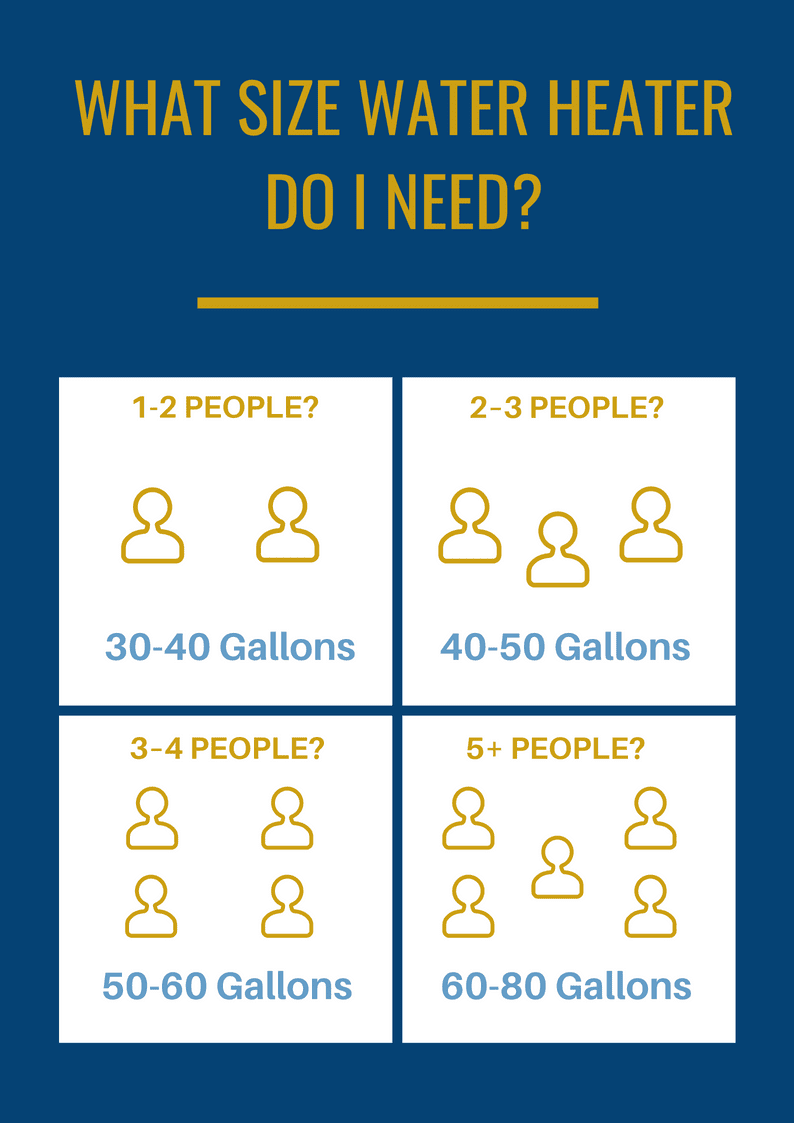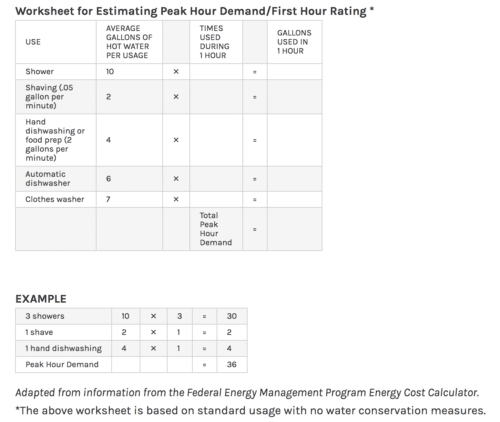The cost to install a tank water heater in Vancouver ranges from $1,199 to $2,500, the average being $1,500.
Is your hot water tank due for an upgrade? Price is probably top of mind for you.
The cost to install a tank water heater in Vancouver normally ranges from $1,199 to $2,500, with most homeowners paying around $1,500.
Your hot water tank installation cost will depend on 5 things:
- Size (and add-ons)
- Type (gas vs electric)
- Efficiency
- Difficulty
- Plumber
Want a consultation to install a tank water heater in your home?
Learn more about what to expect when you hire us to install your water heater.
Cost factor #1: Size
Water heater size (or capacity) refers to how many gallons of water your tank can hold when it’s full. The more gallons your tank can hold and heat, the more expensive it will be.
But you can’t simply buy a smaller water heater to save money. You need one that accurately fits your family and your needs.
Here’s why:
- A tank that’s too small will run out of hot water too quickly.
- A tank that’s too large will be a waste of money because it’s heating water you’ll never use.
How do you know what size water heater you need? You can figure it out using 2 methods:
1. Estimate how many gallons you’ll need based on family size
The chart below will give you a good estimate on what size hot water tank your family will need.

2. Calculate your peak hour demand
For a more accurate calculation, you can figure out your “peak hour demand,” or how many gallons of hot water your family will need during the busiest hour of the day.
All you have to do is use the Energy.gov worksheet below.

Once you know your household’s peak hour demand, choose a water heater with a first hour rating (FHR) that’s within 1–3 gallons of that number. You can find a unit’s FHR (number of gallons of hot water a full tank can supply per hour) on its EnergyGuide label.
For example, the household in the worksheet above has a peak hour demand of 36. They’d need a water heater with an FHR between 33 and 39.
Add-ons that will increase your installation cost
- A drain line. You’ll definitely want a drain pan and line for catching hefty tank leaks, which could cause a lot of damage to your home. If you don’t have them, installing a drain pan and line will increase time and effort needed from the plumber.
- Expansion tank. If you have a “closed” plumbing system (where water can’t flow back into the city water system), you’ll want an expansion tank. This will allow your water, when it gets hot and expands, to overflow into the expansion tank—instead of putting pressure on your tank and eventually making it burst.
- Seismic restraints. In the event of an earthquake, seismic restraints will keep your water heater and its connecting pipes in place. That way, you won’t have to worry about your tank falling over in an earthquake, causing serious water damage to your home.
Cost factor #2: Type
The 2 most common water heater fuel types are gas and electric. Typically, gas water heaters are more expensive to buy, but cheaper to operate compared to electric water heaters (natural gas rates are typically less expensive than electricity rates in Vancouver).
Both fuel types have their pros and cons, so we’ve outlined them in a chart to help you choose:

Cost factor #3: Efficiency
Energy-efficient water heaters are more expensive to buy, but less expensive to operate. A water heater’s efficiency is measured by its energy factor (EF), sometimes called a thermal energy factor (TE).
Most high-efficient gas water heaters have an EF rating of .67–.70. (That means 67–70% of the energy being used is converted into heat.) Most high-efficient electric water heaters have an EF rating of .90 or higher.
You can find a unit’s EF rating either on the manufacturer label or, if you’re looking online, in the product description.
Note: Fortic BC offers a rebate when you buy a new, efficient water heater for your Vancouver home. The more efficient the unit, the bigger the rebate.
Cost factor #4: Difficulty
In short, the more your plumber has to do to install your hot water tank, the more your installation cost will be.
Your plumber might charge more if:
- Your new water heater is being installed in a hard-to-access place (a small crawl space, for example)
- The pipes connecting the water heater to your home’s plumbing weren’t installed properly
- Your water heater is being moved to a different location (because of lack of space or to make it more convenient for you)
- Your current water heater was improperly installed
- Other plumbing appliances, like a water softener, needs to be hooked up to the water heater
Cost factor #5: Plumber
In short, better quality plumbers charge more for their labor.
Why? Well, quality plumbers do better quality work. When you hire a plumber with a lot of experience, you know you’ll get a quality installation. If you’re willing to spend a bit more on labor costs, you’ll save yourself from paying for expensive problems caused by a poorly installed hot water tank down the road.
For example, an improper installation could affect your home insurance coverage should your tank ever leak. If your insurance company finds out that the cause resulted from improper installation, they may not pay out your claim.
We recommend hiring a plumber that:
- Is licensed and insured, so you know they’ll follow the proper codes
- Has good online reviews on sites like Better Business Bureau, Google, Yelp
- Gives you an upfront quote, so get the price before any work starts (and aren’t charged for extra time or materials)
Need a Vancouver plumber to install your hot water tank?
We’ll send one of our trusted plumbers to give you a free in-home consultation. They’ll talk with you about your water needs and preferences, so you get a tank water heater that perfectly fits your home.

